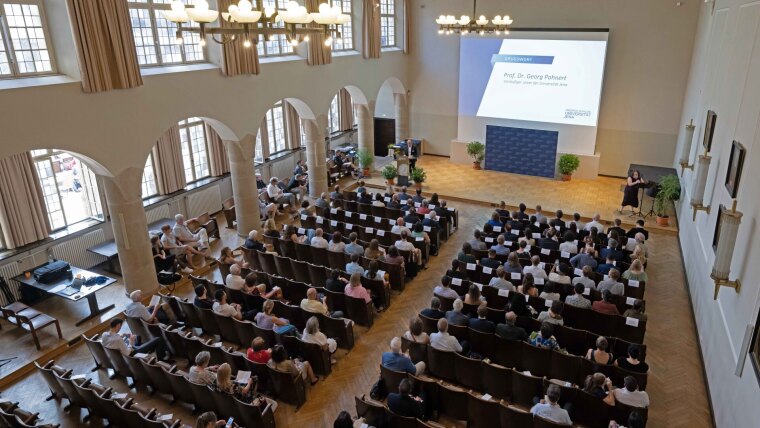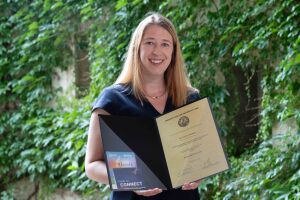
- Awards and Personnel
- Event
Published: | By: Axel Burchardt
The poet of freedom and former professor at the University of Jena, Friedrich Schiller, is constantly honoured at the University named after him. This is particularly evident on the University's highest day of celebration, which bears the name "Schillertag" (Schiller Day) to commemorate his inaugural lecture in 1789. On the occasion of this year's "Schillertag", the best young academics of the past twelve months were also honoured today (28 June).
"I am convinced that you will make the world a better place," said the Interim President of the University, Prof. Dr Georg Pohnert, to the new doctoral graduates. "Your doctorate is not just an academic degree, but a call to actively participate in the social and technological transformations of our time. Help us to strengthen society's understanding of science and facts," continued Pohnert.
This goal was also reflected in the keynote speech on "Resilience in times of disinformation: ways to strengthen democratic societies", which was given by Prof. Dr Edda Humprecht. The head of the Digitalization and the Public Sphere research group at the Institute of Communication Science advocated three main approaches: the promotion of information literacy and critical thinking through education and awareness campaigns must be encouraged. It is necessary to develop and use technologies to identify and combat disinformation and to strengthen social dialogue and cooperation between governments, educational institutions, the media, technology companies and civil society. "To summarize, a holistic approach is needed to increase the resilience of our society against disinformation," said Humprecht.
Honours and award ceremony
Afterwards, the 458 doctoral graduates who successfully completed their doctorates at the University of Jena in the past academic year were presented with their certificates. The best early career researchers then took centre stage.
Junior Professor Dr Anika Klafki was awarded the Rowena Morse Prize.
Image: Jens Meyer (University of Jena)The Rowena Morse Prize for advanced young academics was awarded to the law scholar Junior Professor Dr Anika Klafki. The prize, which is funded by the Friends and Patrons of the University, is endowed with 5,000 euros. The junior professor of public law, who has also been a judge at the Thuringian Constitutional Court since February 2022, has an impressive list of publications – including on the legal management of the coronavirus pandemic, on which she has also taken a stance in politics and the media, according to the award citation. In addition, her habilitation thesis on the systematization of planning law is innovative and contributes to the advancement of knowledge in Law. Her special commitment to teaching was also recognized, particularly with regard to the digitalization of courses offered at the Faculty of Law. And the honoured academic will remain at Friedrich Schiller University. Klafki recently accepted her retention offer and will continue to research and teach in Jena as part of a lifetime professorship.
The doctoral thesis prizes, each worth 750 euros, are also sponsored by the Society of Friends and Patrons of the University. Dr Jonathan Steensen (Faculty of Theology), Dr Leo Juri Kriese (Faculty of Law), Dr Thomas Robert Holy (Faculty of Economics and Business Administration), Dr Florian Hesse (Faculty of Arts and Humanities), Dr Andreas Stotz (Faculty of Social and Behavioural Sciences), Dr Daniel Dörfler (Faculty of Mathematics and Computer Science), Dr Maja Struczynska (Faculty of Physics and Astronomy), Dr Karl Michael Ziems (Faculty of Chemistry and Earth Sciences), Dr Shuaibing Zhang (Faculty of Biological Sciences) and Dr Leonie Karoline Stabenow (Faculty of Medicine) were awarded the prizes during the doctoral ceremony.
At the end of the ceremony, the most beautiful doctoral hats were displayed. Tobias Kaaden from the Otto Schott Institute for Materials Research won the Graduate Academy's online competition. Second place this year went to the hat of Pallabi Paul, who conducts research at the Institute of Applied Physics. Third place went to Franziska Hausig-Punke's hat from the Institute of Organic Chemistry and Macromolecular Chemistry.
